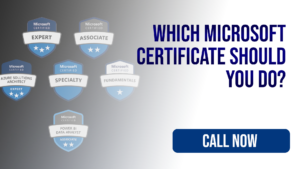Choosing the right cloud certification depends on your career goals, interests, and level of expertise. Here are some popular cloud certifications and considerations to help you decide which one is best for you:
1. Amazon Web Services (AWS) Certifications:
AWS Certified Solutions Architect: Ideal for individuals designing distributed systems on the AWS platform. It’s suitable for architects, developers, and system administrators.
AWS Certified Developer: Focuses on developing applications on the AWS platform. It’s suitable for developers who build cloud applications.
AWS Certified SysOps Administrator: Targets system administrators responsible for managing and deploying applications on AWS.
2. Microsoft Azure Certifications:
Microsoft Certified: Azure Administrator Associate: Suitable for administrators who implement, manage, and monitor Azure solutions.
Microsoft Certified: Azure Developer Associate: Designed for developers who build and deploy cloud solutions on Azure.
Microsoft Certified: Azure Solutions Architect Expert: Aimed at architects who design and implement Azure solutions.
3. Google Cloud Platform (GCP) Certifications:
Google Cloud Certified: Associate Cloud Engineer: Suitable for individuals involved in deploying applications, monitoring operations, and managing enterprise solutions on GCP.
Google Cloud Certified: Professional Cloud Architect: Geared towards architects who design scalable and secure GCP solutions.
Google Cloud Certified: Professional Data Engineer: Targeted at data professionals who design and implement data processing systems and analytics solutions on GCP.
4. CompTIA Cloud+ Certification:
Offers vendor-neutral knowledge of cloud technologies and platforms. It covers cloud concepts, management, security, and troubleshooting. Suitable for beginners or those seeking a foundational understanding of cloud computing.
Consider the following factors when choosing a cloud certification:
Absolutely! Here are the steps to help you choose the best global IT certification for yourself:
1. Assess Your Interests and Career Goals:
Identify your interests within the field of IT. Are you interested in network administration, cybersecurity, programming, cloud computing, or another specialization?
Consider your long-term career goals. Do you aspire to work in a specific industry or role within the IT sector?
2. Research In-Demand Certifications:
Research the most in-demand IT certifications in your chosen field of interest. Look for certifications that are recognized and respected by employers worldwide.
Consider factors such as job market demand, salary potential, and industry relevance when evaluating certifications.
3. Review Certification Requirements:
Review the prerequisites for each certification you are considering. Some certifications may require prior experience or prerequisite certifications, while others may be suitable for entry-level candidates.
Ensure that you meet the eligibility criteria for the certifications you are interested in pursuing.
4. Evaluate Training and Exam Formats:
Explore the training and exam formats for each certification. Consider whether you prefer self-paced online courses, instructor-led training, or a combination of both.
Review the exam format, including the number of exams required, exam duration, and passing score criteria.
5. Consider Industry Recognition and Credibility:
Assess the industry recognition and credibility of each certification. Look for certifications that are endorsed by reputable organizations and industry leaders.
Consider whether the certification is globally recognized and respected by employers in your desired field.
6. Seek Guidance and Advice:
Seek guidance from mentors, career advisors, or IT professionals who have experience with the certifications you are considering.
Join online forums, communities, or networking groups related to IT certifications to gather insights and advice from peers and experts.
7. Evaluate Cost and Return on Investment (ROI):
Consider the cost of obtaining each certification, including exam fees, study materials, and training expenses.
Evaluate the potential return on investment (ROI) of each certification in terms of career advancement opportunities, salary increases, and professional development.
8. Make an Informed Decision:
After thorough research and evaluation, make an informed decision about which global IT certification is best suited to your interests, career goals, and skill level.
Choose a certification that aligns with your strengths, interests, and long-term career aspirations. By following these steps, you can make a well-informed decision about which global IT certification is best for you and take the first step towards advancing your career in the field of Information Technology.









Leave a reply